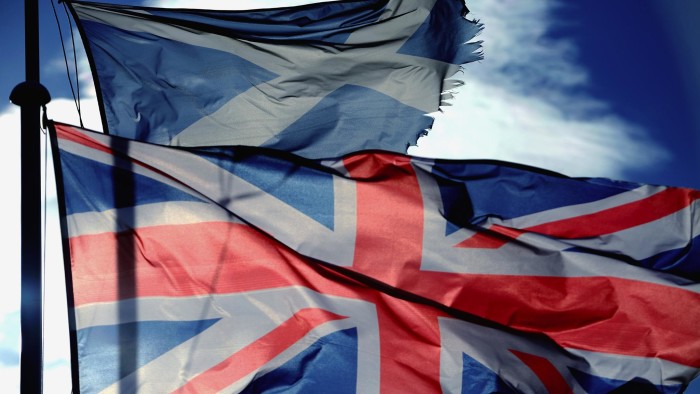A journey into Salmondville

Roula Khalaf, Editor of the FT, selects her favourite stories in this weekly newsletter.
If more Scots were like Neil McDonald then the UK would be secure for another generation. The 34-year-old stands on the doorstep of his semi-detached, pebble-dashed house at the end of a street in Linlithgow, a middle-class town in the middle of Scotland. His young daughter, pretty in a pink princess gown with her face smeared by errant paint, pulls at his Union Jack T-shirt. “They say it’s a gamble worth taking,” Mr McDonald says of Scottish independence, “but it shouldn’t be a gamble at all.”
Mr McDonald knows the issues. He is worried about losing the Bank of England’s lender of last resort function should an independent Scotland fail to secure a currency union with the UK. He sees public spending cuts as necessary to balance the UK’s budget rather than an evil plot. He also feels that secession would put at risk what he has worked hard for.
Unable to afford a house in his home town of Edinburgh, Mr McDonald, who works at the nearby Aldi supermarket, moved to cheaper Linlithgow. He has a mortgage, job, children – a stake in the present. Scots such as Mr McDonald help explain why there is a widening class divide in attitudes to independence, according to opinion polls.
It is those with the most to lose who are scared now that the Yes side has drawn level ahead of the referendum on September 18.
And yet it is the voices of these Scots that have been silenced by the explosive Yes campaign led by Alex Salmond, Scotland’s first minister, who was born in Linlithgow in 1954. Listening to the pro-union Better Together volunteers as they canvass, I sense that they are shell-shocked. “I just wished I’d volunteered sooner,” Linda Hamilton, 73, says.
Living across the road from a Scottish National party politician, she watched as the house opposite became festooned with Yes paraphernalia and started buzzing with activists. She sent an email to the No campaign 18 months ago but says she received no call back. “I feel passionately about this,” Ms Hamilton says, “I want all Britain to be fairer.”
The volunteers are nice people, perhaps too nice. I recognise this slice of Scotland: it is the Scotland of my parents and our own pebble-dashed street. This is a Scotland that is comfortable, sensible, prudent, genteel and, I fear, complacent. They are quietly angry with Mr Salmond for his recklessness with their future and, to a lesser extent, with the No campaign for giving their opponents a monopoly over emotion. “I think many of my friends thought that it’ll be all right on the night,” Ms Hamilton says.
It still might. “I’ve voted No in the postal ballot,” one woman tells me, “but don’t tell anyone.” Another says that she is undecided but then calls me back and whispers, “Actually I’m a No but I don’t want the street to know.”

These are part of the “silent majority”, Scots who will vote No but who feel cowed by the Yes side. I don’t think that this has led to a misleadingly low tally for No in the polls, as some hope. But many No-voting Scots clearly fear expressing their strong pro-union sentiment.
Down the street, when a volunteer knocks on a door, a bellowing sound a bit like a voice is heard from inside: “F*** off! I am a Yes!” No wonder his neighbours are reticent.
Rude as this recluse may be, he is not the problem for Better Together. The bigger trouble for the No campaign are the likes of Gordon Inglis. It is his 60th birthday and his family is celebrating inside but the former ICI worker is more than happy to chat about his ambivalence. “I’m a don’t know,” he says, “but I think I’ll vote Yes.”
Mr Inglis is “a realist”, he adds. He knows that “nothing is for free” (he is wary of the subsidised bus pass he received on his birthday, for instance) but he feels that there are “unknowns on both sides”.
We discuss the nearby Rosyth shipyard, where the building of Royal Navy aircraft carriers could be put at risk by a Yes vote. “Possibly,” Mr Inglish says, “but the way austerity is going I can’t see many ships being built in the future anyway. And Scotland would need a naval fleet of some sort.”
When largely pragmatic voters such as Mr Inglis say there is equivalent risk with a Yes and a No vote, it is a sign of the success the pro-independence side has had in “de-risking” the idea of secession. I say that independence is surely riskier. “I accept it’ll cost us,” he says. “But sometimes you have to step backwards to step forwards.”
Before he returns to his party, Mr Inglis mentions that he went to school with Mr Salmond, who still returns to the town regularly to see his father. “He was quiet and unassuming”, Mr Inglis recalls. “I never thought he would be where he is now.”
Comments